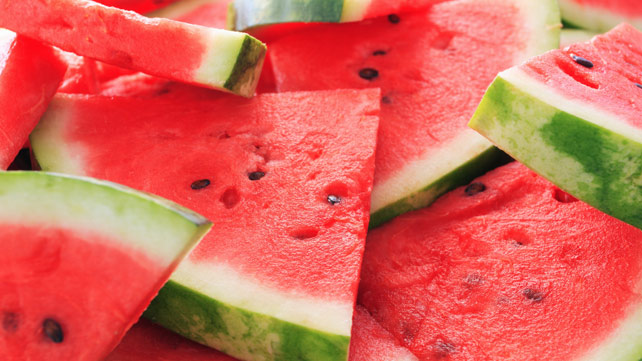You might be
accustomed to spitting them out as you eat — seed spitting contest, anyone? Some
people just opt for seedless. But the nutritional value of watermelon seeds may
convince you otherwise.
Watermelon seeds
are low in calories and are nutrient dense. When roasted, they’re crispy and
can easily take the place of other unhealthy snack options.
How to Roast Them
Roasting
watermelon seeds is easy. Set your oven at 325°F
and place the seeds on a baking sheet. It should only take about 15 minutes for
them to roast, but you may want to stir them halfway through to ensure an even
crispiness.
You can make
the seeds taste even better by adding a little olive oil and salt, or
sprinkling them with cinnamon and a light dusting of sugar. If you prefer more
flavor, you can add lime juice and chili powder, or even cayenne pepper.
Nutritional Benefits
How much
nutrition you reap from watermelon seeds depends largely on how many you eat.
Because they’re small, you need to eat quite a few to get their considerable
benefits. However, when you compare their nutritional value to that of other
snacks out there, watermelon seeds come out far ahead.
1. Low Calorie
One ounce of
watermelon seeds contains approximately
158 calories. That’s not
much lower than an ounce of Lay’s Potato Chips (160 calories), but let’s take a
look at what constitutes an ounce. There are approximately
400 watermelon seeds in
a single ounce, far too many to eat in one sitting. By contrast, there are only
15 potato chips in an ounce, far less than most people would normally munch in
one sitting.
A large
handful of watermelon seeds weighs about 4 grams, which contains about
56
seeds and just 22 calories. Far less than a bag of potato chips!
2. Magnesium
One of several
minerals found in watermelon seeds is magnesium. In a 4 gram serving, you’ll
get 21 mg of magnesium. The
FDA
recommends adults get 400 mg of this mineral daily. Magnesium is essential
for many of the body’s metabolic functions. It’s also required to maintain
nerve and muscle function, as well as immune, heart, and bone health.
3. Iron
A handful of watermelon seeds contains about 0.29 mg of
iron. It might not seem like much, but the FDA only recommends adults get 18 mg
in their day.
Iron
is an important
component of hemoglobin — carrying oxygen through the body. It
also helps your body convert calories into energy.
4. Folate
There are 2 μ of folate in a single
serving of watermelon seeds. The FDA recommends adults get 400 μ each day.
Folate,
also known as folic acid or vitamin B-9, is important for proper brain function
and also works to control homocysteine levels. Women of childbearing years need
even more, since folate deficiency has been associated with certain neural
tubal birth defects.
5. ‘Good’ Fats
Watermelon
seeds also provide a good source of both monounsaturated and polyunsaturated
fatty acids — 0.3 and 1.1 grams, respectively. According to the
American
Heart Association, these fats are useful in protecting against heart attack
and stroke, and lowering levels of “bad” cholesterol in the blood.
The Takeaway
Watermelon
seeds have many health benefits. Although the amounts of some minerals and
vitamins within them may seem low, they are still far preferable to potato
chips and other unhealthy snacks.
